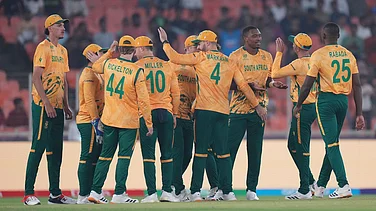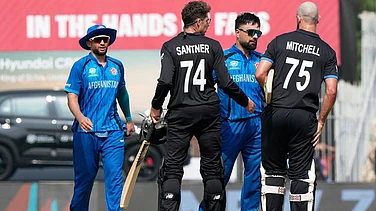April isn’t the cruellest month for the BCCI, for the world’s biggest T20 league tournament is here. The 11th edition of the Indian Premier League (IPL) is different in many ways. Not just because the Chennai Super Kings (CSK) and Rajasthan Royals (RR) are returning after serving their betting-fixing-related two-year bans. It is also the start of a new cycle of five-year media rights, which were sold for an astronomical Rs 16, 347.5 crore. This is the first time seven Indians—a maximum—are captain of their teams. SunRisers Hyderabad’s captain, New Zealander Kane Williamson, is the exception.
The 2018 IPL will be a commercial windfall for the BCCI as it has guaranteed an income of at least Rs 4,500 crore from sponsorships. A lion’s share of it has come from media rights, under which the BCCI will receive Rs 4,086.88 crore for 2018. It will pay equal instalments of Rs 3,056.16 crore in the next four years.
But these big numbers would also make the BCCI wary of any scandal. As the IPL churns out more money, anti-corruption unit sleuths are extra cautious, keeping in mind betting and spot-fixing incidents in the past. Since the 2009 IPL, the BCCI has hired the International Cricket Council (ICC) Anti-Corruption Unit (ACU) to ensure that its golden goose remains corruption free. The anti-corruption sleuths will keep a sharp watch this year too.
The BCCI has appointed a new ACU head, Ajit Singh, an ex-Rajasthan police DGP. While he took charge on April 3, the outgoing head Neeraj Kumar was given an extension till May 31 for a smooth transition. “I’m studying the system in place and once I’ve understood it, things will be chalked out soon,” Ajit Singh, 60, tells Outlook. He will be focused on people associated with the unauthorised leagues which have sprung up. “If they are into this business, they will probably try to do that because there is bigger money in the IPL. That is why vigilance is required to check them, and one has to work in coordination with the local police,” he says.
Neeraj Kumar too says anti-corruption personnel will be particularly keeping an eye on two types of suspicious people. “People who have been associated with the unauthorised leagues are now our Persons of Interest as we say in our jargon. They are persona non grata for us. We’ll not allow them anywhere near the players or the areas in stadiums demarcated as ‘players and match officials area’. We will keep an eye on new IPL players and we will also see if they have played in any of the unauthorised leagues. Apart from that, we will keep a close watch on sensitive venues, like in Rajasthan,” says Kumar. In Rajasthan, Jaipur is the lone venue, home to the comeback franchise Rajasthan Royals, which was banned for two years by the Supreme Court following an inquiry into the 2013 IPL betting-fixing scandal. It was charged that one of their co-owners, Raj Kundra, and some RR players were involved in betting-fixing.
As part of the anti-corruption measures, BCCI deputes a Team Integrity Officer to each team and he is embedded with it throughout the tournament. Besides, it used to ‘loan’ one Anti-Corruption Manager to the ICC ACU for the duration of the IPL, but this time it will not be doing so. Interestingly, IPL is the only officially sanctioned T20 league in the world that hires the ICC ACU. BCCI hires ICC sleuths perhaps to emphasise that it adheres to the highest anti-corruption measures, more so after the 2012 sting done on some India players by an Indian TV channel and the infamous 2013 betting-fixing scandal.
Once bitten, RR have separately taken steps to avoid a recurrence of the shameful events. It has appointed K.P. Raghuvanshi, a former chief of Rajasthan’s anti-terrorism squad, as its security and ethics officer and Javed Shaikh, a former additional superintendent of police, as his associate. However, the Chennai Super Kings, whose official Gurunath Meiyappan was also banned for life by the BCCI for his role in the scandal, have not taken similar steps so far.

The IPL security is again in the hands of Group 4 Security (G4S), which replaced South African firm Nicholls Steyn and Associates (NSA) in the 2016 IPL. Impressed by its performance during the 2016 ICC World Twenty20 held in India, Neeraj Kumar had asked for it to replace NSA. The move enabled the BCCI to save about Rs 15 crore on security alone. At the IPL, G4S provides two Security Liaison Officers—one from India and one G4S staff in South Africa—to each of the eight franchises, and these personnel are supported by 10 city controllers and two nodal security managers.
But is it necessary to get outside agencies for security and vigilance? The BCCI pays a considerable amount to the ICC ACU—around $1,000 a day of the IPL and a total of around Rs 6 crore for the length of the trournament. “Even for the anti-corruption measures, the BCCI can save a lot of money if an Indian agency is handed the task. An Indian agency could do the same work for anything between Rs 50 lakh and Rs 75 lakh, says a BCCI official. No other league, be it Big Bash in Australia or South Africa’s Ram Slam, employs ICC ACU, so why can’t BCCI do without it?” he wonders.
The official says in other areas of the IPL too, Indian agencies can do as good a job. “International Management Group (IMG), a foreign firm, has been organising the IPL since its inception in 2008. The BCCI pays IMG an average Rs 30 crore per IPL. When Indian firms can successfully organise the bilateral series on BCCI’s behalf at home, they can surely organise the IPL. But for some strange reason the BCCI is persisting with IMG,” says the official.
His is not the lone dissenting voice within the BCCI; there are others who wonder about the professionalism behind these foreign deals. Another point of argument is the same set of vendors, both Indian and foreign, have been providing services since 2008. “Over 90 per cent of vendors are continuing from the beginning of the IPL, something that is strange and unprofessional,” says an official. BCCI should develop two-three vendors, like it’s done in the corporate world, so that there is healthy competition, he argues.
The eight-team IPL will be played at ten venues, as two franchises are using two ‘home venues’. There have been problems with certain venues; in Hyderabad, for instance, the bank account of the home association was frozen recently, though it was reversed later. To avoid these, there is a suggestion that the BCCI should keep at least two stand-by venues ready for emergencies. That could happen next year. For now, it will rain fours and sixes at India’s beloved IPL, in what is predicted to be the hottest summer ever.


























